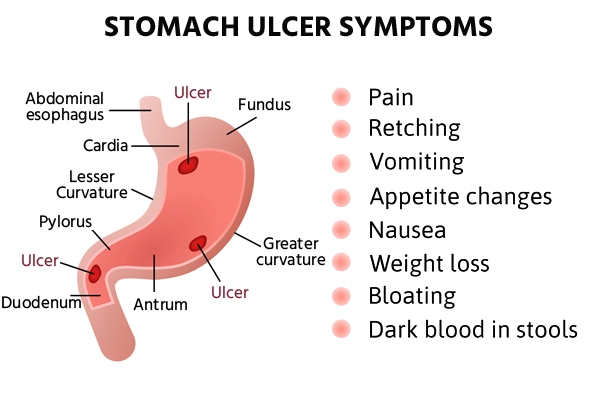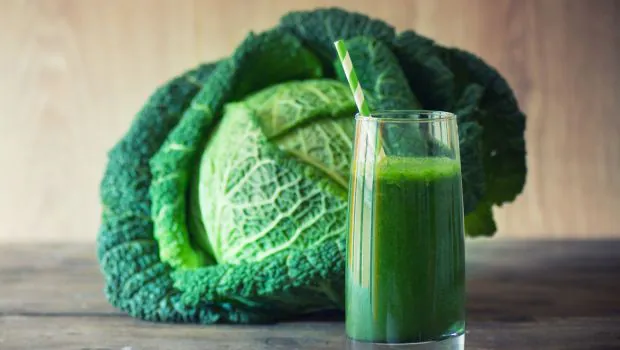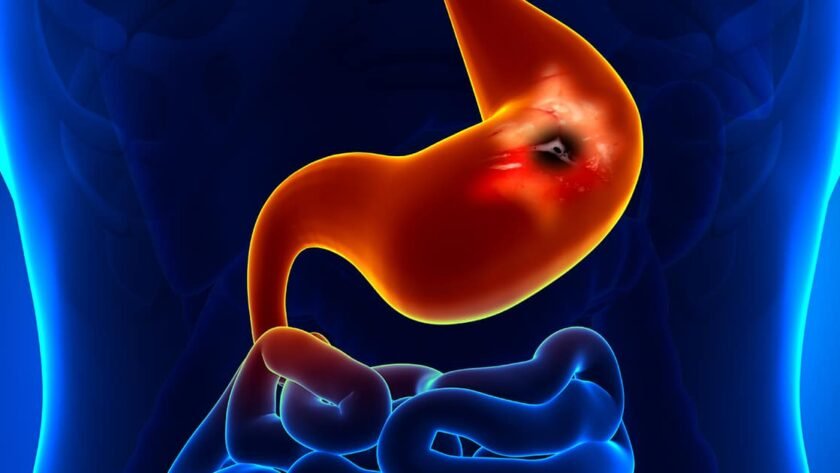Table of Contents
Brief The Article:
Why are gastric ulcers related to zinc deficiency?
Contrary to mainstream medical beliefs, zinc deficiency is a major cause of gastric ulcers. Diet plays a vital role in ulcer formation, with refined grains and “healthy” whole grains containing phytates that deplete zinc levels.
How does zinc deficiency affect the stomach?
Zinc deficiency leads to increased gastric juices, acid secretions, and pepsin production, which can damage the stomach lining. It also reduces mast cell production, crucial for regulating the stomach’s inner lining and maintaining mucosal barrier integrity.
What are the common misconceptions about ulcer causes?
Mainstream medicine often attributes ulcers to H. pylori, NSAIDs, stress, and alcohol, overlooking the significant role of diet and zinc deficiency. The ineffectiveness of milk as a treatment historically led to the belief that diet doesn’t play an important role.
How can one improve zinc levels and treat ulcers?
1. Fix your diet (avoid refined grains)
2. Take zinc carnosine supplements
3. Practice intermittent fasting
4. Drink cabbage juice
5. Use chlorophyll (e.g., wheatgrass juice powder)
Why is zinc supplementation important?
Zinc supplementation helps reduce excessive gastric acid production, supports mast cell function, maintains stomach lining integrity, and boosts immunity, especially against H. pylori.
Are ulcer symptoms always present?
No, one-third of people with ulcers have no symptoms whatsoever, making awareness and prevention through proper zinc intake even more critical.
Additional Recommendations for Ulcer Healing:
- Intermittent fasting can give your digestive system a break and allow the stomach lining to heal.
- Cabbage juice, rich in Vitamin U, is a natural remedy known for its soothing and healing properties.
- Chlorophyll, found in wheatgrass juice and other green plants, can help soothe inflammation and promote healing in the digestive tract.
So let’s dive into the details…
Why gastric ulcers are a zinc deficiency
Diet and Gastric Ulcers

I wanted to find out what mainstream medicine thought about the relationship between your diet and ulcers so I looked it up and this is what they said the diet does not play an important role in causing or preventing ulcers wow that’s interesting then what causes it it said H. pylori, NSAIDs,
which are pain pills stress and alcohol and the reason why they said that diet does not play an important role is because before we had medications for ulcers doctors use milk and milk wasn’t very effective
so, therefore, diet doesn’t play an important role well i’m going to tell you that is false information your diet does play a vital role in whether you get an ulcer or not because what they missed in the causes is the biggest cause which is a zinc deficiency
- Mainstream medicine claims diet doesn’t play an important role in ulcers
- Believed causes: H. pylori, NSAIDs, stress, and alcohol
- The historical ineffectiveness of milk as a treatment led to this misconception
- The biggest overlooked cause: zinc deficiency
How Zinc Deficiency Occurs

How does a person become deficient in zinc well just do what i did in college eat a lot of refined grains
pasta pizza muffins cereals that’s what I did and did I get an ulcer absolutely so these so-called healthy whole grains actually have a lot of phytates in them that pull the zinc out
so i got an ulcer and it was so bad i mean i was up at night i had a lot of problems but of course i did not connect the dots at that time this persisted for a long time i started taking medication for it and um just went from bad to worse and what’s interesting is one third of people who get ulcers have absolutely no symptoms whatsoever
- Eating refined grains (pasta, pizza, muffins, cereals) can lead to zinc deficiency
- “Healthy whole grains” contain phytates that deplete zinc
- Personal experience of severe ulcer due to zinc deficiency
- One-third of people with ulcers have no symptoms
How to improve your zinc level
Natural Remedies for Ulcers and Zinc Deficiency

So what i want to tell you is there’s something that you can do about this okay number one you have to fix your diet if you’re new to my blog site click the diet down below what you need to be on
but for some immediate help just start taking zinc the type of zinc you need to be taking is zinc carnosine

I’m not going to get into brands but just find a good brand that has good reviews number two you need to do intermittent fasting very important to heal this ulcer number three cabbage juice is a very effective remedy and number four chlorophyll as in wheatgrass juice powder or other types of chlorophyll it’s great to heal the inside of your digestive tract but the most important thing is the zinc
- Fix your diet
- Take zinc carnosine supplements
- Practice intermittent fasting
- Drink cabbage juice
- Use chlorophyll (e.g., wheatgrass juice powder)
The Importance of Zinc in Preventing Ulcers

Why because if your body is more deficient in zinc you’re going to make more gastric juices and acid secretions you’re going to pump up more pepsin which is an enzyme that can dissolve the inside of your stomach
also, you’re not going to make enough mast cells and mast cells help you regulate the inner lining of your stomach which is all about supporting the integrity of the mucosal barrier in your stomach not to mention zinc will improve immunity especially if you’re fighting H. pylori
- Zinc deficiency leads to increased gastric juices and acid secretions
- More pepsin production can dissolve the stomach lining
- Zinc is crucial for mast cell production, which regulates the stomach lining
- Zinc supports mucosal barrier integrity
- Zinc improves immunity and is helpful against H. pylori
Additional-resources
Healthy Ketogenic Diet and Intermittent Fasting:
Summary
- “Diet does NOT play an important role in causing or preventing ulcers.”
- So what causes ulcers then? They say H. pylori, NSAIDs, stress, and alcohol are the only causes.
- This is false information. Your diet does play a vital role in your risk of ulcers.
- The biggest cause of ulcers is zinc deficiency.
- Consuming refined grains and other carbohydrates can deplete zinc in your body because they are rich in phytates.
- Many people have ulcers from refined carbs and don’t know they have one. In fact, 1/3 of people who have ulcers don’t have any symptoms.
- Thankfully, there are some simple things you can do to increase your zinc.
- The first thing you need to do is improve your diet. If you’re new to my channel, check out the links above to learn more about Healthy Keto.
- While you’re improving your diet, you can also use zinc supplements until your zinc level is normalized.
The best remedies for ulcers include:
- Take zinc carnosine
- Fasting
- Cabbage juice
- Chlorophyll (wheatgrass juice powder)
FAQ
Can zinc deficiency cause ulcers?
Yes, zinc deficiency can indeed cause ulcers. Zinc plays a crucial role in maintaining the integrity of the stomach lining and regulating gastric acid production. When zinc levels are low, it can lead to:
- Increased gastric acid secretion
- Reduced production of protective mucus
- Impaired healing of the stomach lining
These factors collectively increase the risk of developing gastric ulcers. Additionally, zinc deficiency can weaken the immune system, making it harder for the body to fight off H. pylori bacteria, a common cause of ulcers.
Can zinc help gastric ulcer?
Absolutely. Zinc supplementation can be beneficial in treating and preventing gastric ulcers. Here’s how zinc helps:
- Promotes healing of the stomach lining
- Reduces excessive gastric acid production
- Enhances the mucosal barrier function
- Boosts immune function to combat H. pylori
Zinc carnosine, a specific form of zinc, has shown particular promise in ulcer treatment. It adheres to the stomach lining, providing a protective effect and promoting faster healing of ulcers.
What gastrointestinal diseases cause zinc deficiency?
Several gastrointestinal conditions can lead to zinc deficiency:
- Inflammatory Bowel Disease (IBD), including Crohn’s disease and ulcerative colitis
- Celiac disease
- Chronic diarrhea
- Short bowel syndrome
- Pancreatic insufficiency
These conditions can impair zinc absorption in the small intestine or increase zinc loss through the digestive tract, leading to deficiency over time.
Can zinc cause gastritis?
While zinc is generally beneficial for gastric health, excessive zinc intake can potentially cause gastritis in some cases. This is typically associated with:
- Very high doses of zinc supplements
- Taking zinc on an empty stomach
- Individual sensitivity to zinc
It’s important to note that zinc-induced gastritis is rare when zinc is taken as recommended. In fact, appropriate zinc intake is more likely to prevent or alleviate gastritis than cause it.
What deficiency causes stomach ulcers?
While zinc deficiency is a significant factor, several nutrient deficiencies can contribute to stomach ulcers:
- Zinc deficiency
- Vitamin A deficiency
- Vitamin C deficiency
- Vitamin E deficiency
- Selenium deficiency
Among these, zinc deficiency is particularly important due to its role in maintaining stomach lining integrity and regulating gastric acid production.
What deficiency causes ulcers?
Various nutrient deficiencies can contribute to the development of ulcers, including:
- Zinc deficiency: Impairs stomach lining integrity and increases acid production
- Vitamin B12 deficiency: Can lead to pernicious anemia, increasing ulcer risk
- Iron deficiency: May impair the healing of stomach lining
- Vitamin C deficiency: Reduces the body’s ability to repair damaged tissue
- Protein deficiency: Can weaken the stomach’s mucosal barrier
While these deficiencies can contribute to ulcer formation, it’s important to note that ulcers are often multifactorial, involving diet, stress, medications, and H. pylori infection.
Does zinc kill H pylori?
While zinc doesn’t directly kill H. pylori, it plays a significant role in combating this bacteria:
- Enhances immune function, helping the body fight H. pylori more effectively
- Reduces inflammation in the stomach, creating a less favorable environment for H. pylori
- Supports the integrity of the stomach lining, making it harder for H. pylori to establish itself
- May increase the effectiveness of antibiotics used to treat H. pylori infections
Studies have shown that zinc supplementation, especially when combined with standard H. pylori treatment, can improve eradication rates and reduce symptoms associated with H. pylori infection.




